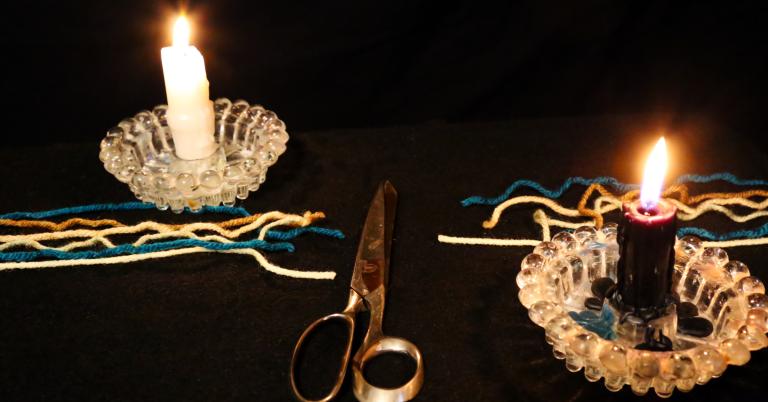Last week there was an article going around from the National Catholic Register (a conservative Catholic site owned by EWTN) titled More People Are Demanding to Be ‘Debaptized’ — Here’s What’s Wrong With That. The Pagan and occult internet started arguing about it, with some insisting debaptism isn’t possible, some insisting it isn’t necessary, and others telling their own stories of debaptism and how it helped them.
Here’s the key quote from the Catholic article by Jimmy Akin:
“When you get baptized, an indelible spiritual mark is put on your soul, and nothing can remove this.”
Akin isn’t entirely wrong. He’s just wrong in the ways that matter, and that’s what I’d like to discuss in this post.
What I’m not going to do is go into a theological analysis of the Christian rite of baptism, especially the difference between infant baptism (as practiced by Catholics and many other churches) and “believer’s baptism” (as practiced by Baptists and most other Evangelicals). For our purposes as Pagans and polytheists, it’s enough to say that baptism is, in the words of the Catholic Catechism, a “Christian initiation.”
I have mixed feelings about infant baptism. On one hand, of course parents, grandparents, and other family want their new child recognized by their religious community. On the other hand, making religious commitments for someone else – even your own child – is a serious violation of their free will. And on the third hand, the idea that you can and should choose your own religion is a very modern, very Western idea.
I have on occasion been asked to officiate a Pagan naming ceremony for a newborn or other child. I always include these words:
We welcome you to this world, and to this community. Though we hope you will someday take your place as a full member of our grove, we do not claim you for our path, for no one can dictate the steps of another.
Still, the idea that baptismal marks and commitments are invalid because the child cannot consent is, in my experience, wishful thinking. They are real. So were those placed on me when I was baptized in the Baptist church at age 8. Still, while I made a clean break with Christianity, I never felt the need to undo my baptism.
Don’t look for a religious solution to a political problem
In the United States we argue about whether or not churches should pay taxes. In much of Europe, churches are supported by taxes. Sometimes that means there’s an established church, as with the Church of England. Other times that means a small portion of your taxes goes to the church of which you’re a member.
And churches are notorious for never scrubbing their membership rolls.
So people who leave a church – especially those who become “unaffiliated” – try to get their names removed from the church rolls.
This is a political problem, not a religious problem. As an American, I’m appalled at the idea of tax money going to support churches (one of the reasons I strongly oppose school vouchers). If a country insists on doing it, they need to make it a checkoff, like the U.S. Presidential Election Campaign Fund.
Church taxes are a political problem and debaptism isn’t the solution.
You can’t unring a bell
Here’s where Jimmy Akin is right: once a baptism is done, it’s done. And people shouldn’t expect churches to pretend it wasn’t. Akin talked about one person who renounced his baptism and the church records were updated to show that. But the person wasn’t satisfied, and “he sued the Church to have his name removed from the records.”
If you get married and later decide that was a bad idea, you can get divorced – the marriage can be dissolved. But that doesn’t mean the marriage never happened. Even if you go through all the legal, spiritual, and emotions hoops to end the marriage, that relationship changed you – perhaps subtly, perhaps dramatically.
The Catholic church doesn’t help its case here with their position on marriage. They say a marriage can be annulled, which basically states it was never a valid marriage to begin with – it never happened. Meanwhile, they don’t recognize the validity of a divorce, despite the fact that they happen successfully all the time.
It’s no wonder some people want an annulment of their baptism.
But you can’t unpour water. The baptism happened and we can’t pretend it didn’t.
But we can reverse its effects.
Polytheists shouldn’t be constrained by monotheist thinking
I know some occultists who hang out in the Big Tent of Paganism are monotheists. Some practice from a Christian worldview. Some are Christians, even though the Catholics and the Baptists would say they’re very bad Christians. That’s their business, not mine.
I’m a polytheist practicing from an animist worldview – I see the world in a different way. I see their God as one God among many, and I’m not the least bit persuaded by appeals to Christian doctrine and scripture.
That doesn’t mean I think a Christian initiation is ineffective. But as a polytheist, I evaluate the claims for what baptism does – and especially for how irreversible it is – in the context of a world full of many Gods, not one God.
A promise made for you is ethically invalid
I discussed this a few years ago in Integrity is Complicated: Breaking a Promise From Your Old Religion. That’s a slightly different question than the one we’re discussing here. If you were baptized without your consent – or if, like me, you were baptized without informed consent – you have no ethical requirement to keep the promises that were made and implied at your baptism.
But again, that doesn’t mean it didn’t happen.
The important question is whether or not your baptism doing anything. Or is it just something that happened to you? Lots of stuff happens to us as children and much of it isn’t good. Most times we get over it. Sometimes getting over it requires therapy. Other times we just move on to something bigger and better.
Is this something you think about a lot? Does it bother you that you were baptized? If not, you probably don’t need a debaptism.
Marks fade over time
Any good initiation leaves a mark. As I write this I feel the mark from my first Pagan group initiation 19 years ago – it feels as right now as it did then. But I’ve reinforced that mark on a near-constant basis with reading and study, with rituals and celebrations, and especially with daily practice.
Marks that aren’t reinforced fade over time. My baptism mark is still there, but I have to look for it to find it. It holds no power over me – not anymore.
Connections can be severed
When someone asks me about recovering from the harmful effects of fundamentalism, my first response is always “stop the bleeding.” Get out. Stop attending fundamentalist churches. Stop reading their books and websites. Stop listening to TV and radio preachers.
I speak here of fundamentalism. Christianity – Protestant, Catholic, or Orthodox – can be a perfectly fine religion, at least for some people. Fundamentalist Christianity is never a good religion. But the process of cutting ties is the same.
And that process begins with the mundane act of walking away and staying away.
When those spiritual marks stop being reinforced, they start to fade.
No debaptism required.
Crowd out bad experiences with good experiences
Once the connections are severed, the best thing you can do to make that mark fade faster is to fill your life with positive religious experiences.
For me, this began with a year of dedicated spiritual practice – the first time in my life I had done that. Then I found a group and began to practice with other Pagans. I had the initiation I mentioned above, I began to lead rituals, and then to do deeper work both on my own and in small groups.
It felt good. It felt right.
When it comes to religion, you can take someone else’s word for it, or you can experience it for yourself. Paganism is a religion of experience.
Good religious experiences crowd out bad religious experiences and leave no room for them in your soul.
You may want a debaptism ceremony
You probably don’t need a debaptism ceremony. But you may want one.
A well-done ritual can sever the spiritual and psychic ties between you and a religious tradition you no longer wish to be associated with. It can give you the spiritual strength to physically walk away. It can begin the healing process, and if the connection wasn’t completely broken already it can speed it up the break.
Several people mentioned they did the Traditional Witchcraft practice of saying the Lord’s Prayer backwards. This is an act of Christian blasphemy – it burns the bridges so you can’t go back.
If it worked for them, great. I don’t like it, because it reinforces a Christian worldview. Which, let’s face it, is the environment in which Traditional Witchcraft evolved. But your goal isn’t to become an anti-Christian, it’s to become a non-Christian.
I prefer a cord-cutting ritual. Let the act of physically cutting ties in this world symbolize the act of psychically cutting ties in the spirit world. Include an element of cleansing – and if you use water, also use smoke, and perhaps sound. Do it in a magical environment that includes enough accoutrements and ritual to make it feel like the important act it is. End it with a dedication to the new religion you want to pursue.
And if that’s no religion? That’s OK. Ritual and ceremony have psychological components that can benefit atheists and skeptics as well those of us whose experiences have convinced us we live in a world with many Gods where magic is real.
Move on
There have always been a few people who left the religion of their birth to follow a new religion. Now the practice is commonplace, at least in the West. Most simply walk away from the old and embrace the new, and that’s usually all that’s required.
The experiences of our old religions leave a mark, sometimes metaphorically and sometimes spiritually. Those marks fade over time, and for most of us – myself included – that’s sufficient. Most people don’t need debaptism.
But if you have a need or a desire to speed up that process, or if your own marks are particularly stubborn, a well-crafted and well-conducted debaptism ceremony can be helpful.
Blessings to you as you follow the path to which you are called, whatever it may be.




















